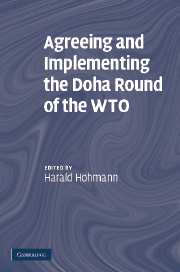Book contents
- Frontmatter
- Contents
- List of Contributors
- Foreword
- Introduction
- The future of the Doha Round
- PART ONE Development policy of the WTO
- 2 Developmental aspects of the Doha Round of negotiations
- 3a Aspects of development policy in the Doha Round – An EC perspective
- 3b An assessment of the Sixth WTO Hong Kong Ministerial Conference from a development perspective
- 4 Capacity building and combating poverty in the WTO
- 5 Integrating development and SDT (Special and Differential Treatment) into the architecture of the WTO – through the operation of its Dispute Settlement System
- PART TWO Trade policy (including competition) and trade facilitation
- PART THREE Reform of the dispute settlement system
- PART FOUR Social rights, health, and environment
- PART FIVE Conclusions
- Index
3b - An assessment of the Sixth WTO Hong Kong Ministerial Conference from a development perspective
from PART ONE - Development policy of the WTO
Published online by Cambridge University Press: 23 February 2010
- Frontmatter
- Contents
- List of Contributors
- Foreword
- Introduction
- The future of the Doha Round
- PART ONE Development policy of the WTO
- 2 Developmental aspects of the Doha Round of negotiations
- 3a Aspects of development policy in the Doha Round – An EC perspective
- 3b An assessment of the Sixth WTO Hong Kong Ministerial Conference from a development perspective
- 4 Capacity building and combating poverty in the WTO
- 5 Integrating development and SDT (Special and Differential Treatment) into the architecture of the WTO – through the operation of its Dispute Settlement System
- PART TWO Trade policy (including competition) and trade facilitation
- PART THREE Reform of the dispute settlement system
- PART FOUR Social rights, health, and environment
- PART FIVE Conclusions
- Index
Summary
Introduction and background
In the early hours of Sunday morning, on the 18 December 2005, as the negotiations amongst about thirty Ministers began to conclude, the ‘grand bargain’ that was needed for the WTO Hong Kong Ministerial Meeting to succeed was clearly in sight. However, there were significant differences in the perspectives of these Ministers, on the composition of the key elements of the bargain and the timing of the Doha deal. In this assessment we provide a perspective on the recent Hong Kong Ministerial Meeting and outline the central fault lines of this ‘grand bargain’. Some suggestions will be made which could help to advance the negotiations towards the successful achievement of this ‘grand bargain’.
The central fault line or principle in the current Doha talks was clearly articulated by the Commissioner of the EU, Peter Mandelson, in his statement after the Hong Kong Meeting. In this statement Mandelson argues that the EU was unlikely to make further concessions in the current Doha negotiations given the paucity of concessions, in his view, that are on offer from the EU's trading partners. He goes on to state that there was no possibility of him using the WTO to push through, further, or early, reforms of the EU Common Agricultural Policy (CAP). Although the EU at its recent summit had decided to review the EU CAP budget in 2008/2009, Mandelson warns that there would be no links between this and the efforts to conclude the Doha negotiations early in 2007.
- Type
- Chapter
- Information
- Agreeing and Implementing the Doha Round of the WTO , pp. 98 - 110Publisher: Cambridge University PressPrint publication year: 2008



